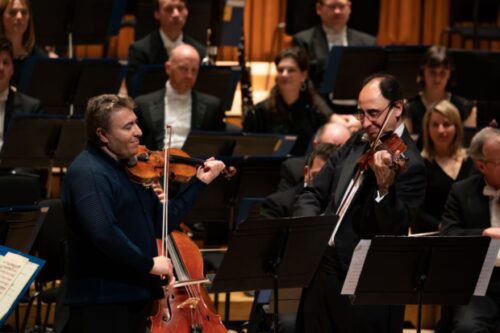 United Kingdom Brahms, Mendelssohn: Maxim Vengerov (violin), Oxford Philharmonic Orchestra / Marios Papadopoulos (conductor). Barbican Hall, London, 6.2.2023. (CC)
United Kingdom Brahms, Mendelssohn: Maxim Vengerov (violin), Oxford Philharmonic Orchestra / Marios Papadopoulos (conductor). Barbican Hall, London, 6.2.2023. (CC)

Brahms – Academic Festival Overture, Op.80 (1880)
Mendelssohn – Violin Concerto in E minor, Op.64 (1838-44)
Brahms – Symphony No.2 in D, Op.73 (1877)
Part of the Oxford Philharmonic’s Silver Jubilee Year celebrations, this was an attractively programmed and mostly beautifully executed evening. Good old ‘meat and two veg’ concerts (the format Overture – Concerto – Symphony that in my youth was pretty much every symphony concert) are few on the ground these days, so this was particularly satisfying.
For the Academic Festival Overture it was nice to have antiphonally placed violins which always work well in Brahms. The orchestral placement was clearly thought-through, placing the double basses behind the first violins to ‘ground’ their sound (it helps stop them going sharp). Marios Papadopoulos obviously has a deep understanding of Brahms’s scoring, not least in the importance of trombones to the texture. Initial rhythms were taut; the lead-in to the famous climactic statement of the tune of ‘Gaudeamus igitur’ (a song traditionally linked to schools, academies and universities).
The presence of Maxim Vengerov playing Mendelssohn, I am sure, had a lot to do with the packed-out hall (it wasn’t the whole story, since from what I could see, few left after the interval). Vengerov played the first movement with such ease, his focused tone projecting easily in the Barbican’s tricky acoustic. While he makes it look easy, Vengerov also found the essence of Mendelssohn; as did Papadopoulos, with the orchestra light and crisp. Orchestral detail was superb; wonderful to hear so many delightful woodwind contributions, too. The central Andante was a dream, both Vengerov and Oxford Philharmonic aglow. The stopping passage for solo violin was spectacularly good, although at this level perhaps one should expect nothing less. What was truly lovely was the sense of heartfelt expansiveness. The transition to the finale was impeccably judged by all, the interruptive but restrained trumpet fanfares well managed. The spirit of A Midsummer Night’s Dream infused the deliciously light-footed finale, the Oxford Philharmonic nicely on its toes. When the music expands into a long melody, first on solo violin then shortly thereafter on orchestra (strings enhanced by horn), the effect was magical.

An encore – and a collaborative one. Vengerov was joined by the Oxford Philharmonic’s leader, Carmine Lauri (a familiar name from the London Symphony Orchestra) in the finale from J. S. Bach’s Double Concerto for Two Violins in D minor, BWV 1043. Pure joy to watch the two violinists, effectively, banter via Bach. Lines were exchanged easily (the two solo parts are equivalents in terms of importance and difficulty). The camaraderie between Vengerov and Lauri as they took applause was evident; and it was there in the music, too.
Brahms’s Second Symphony is, rightly, a perennial favourite. The first movement in the wrong hands can sprawl; not here, as (conducting from memory) Papadopoulos’s understanding of Brahms’s processes brought with it taut rhythms and sometimes exquisite orchestral balances: the importance of trombone timbre was particularly noteworthy, giving the whole a deep resonance. The pastoral basis of the first movement was perfectly realised. Nice that the second movement, marked Adagio non troppo, had the ‘non troppo’ honoured. It moved, in other words. Woodwind detail was superb, as was Papadopoulos’s realisation of Brahms’s harmonic framework on both immediate and lager scales. A special mention for Clara Dent’s beautiful oboe solo that opened the third movement. I wonder how much rehearsal went into the Presto non assai, as off-beat accents were perfect, as were exchanged between string and wind. The finale moved with a sense of inevitability from the (not quite together) opening to a blazing conclusion via what sounded in this performance like a foreshadowing of Mahler’s First Symphony.
The odd slip of ensemble aside, this was a fabulous concert, a real celebration of the many strengths of the Oxford Philharmonic. Here’s to the next 25 years …
Colin Clarke
